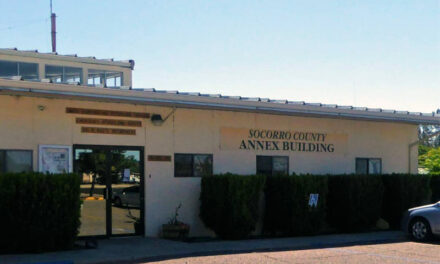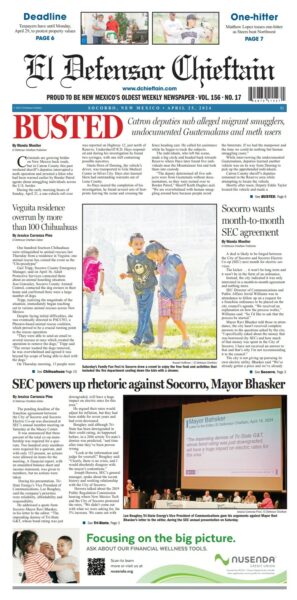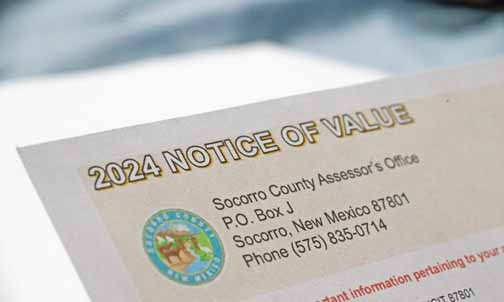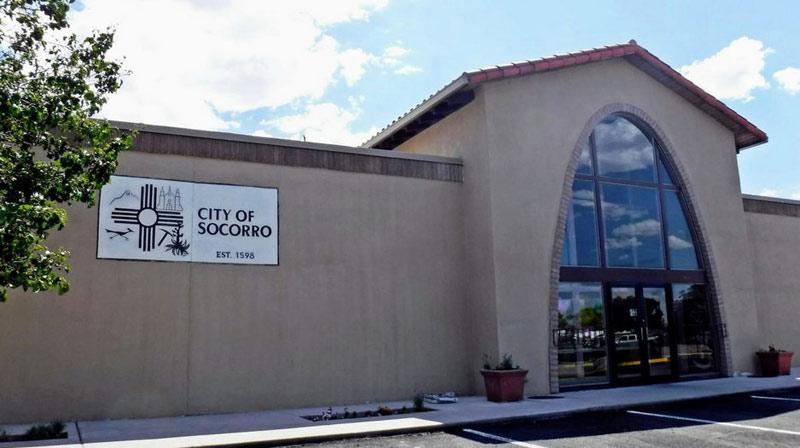A $1.2 trillion infrastructure bill was signed into law by President Biden Monday.
The Chieftain spoke with Senator Ben Ray Luján about how that bipartisan infrastructure bill could impact the Socorro community. Luján visited Socorro and Catron Counties last Wednesday to discuss the infrastructure bill and the proposed social safety net bill with local leaders.
The infrastructure bill passed the Senate in August with a 69-30 vote and passed the House in November with a 228-206 vote. Congressional District 2 Representative Yvette Herrell voted against the bill.
Herrell was unavailable for an interview, but emailed a comment criticizing the bill for “Out-of-control spending on wasteful projects.”
The infrastructure deal should invest $2.5 billion in roads and bridges in New Mexico, said Luján.
There is a $55 billion investment in water infrastructure. Luján said that $355 million is expected to come to New Mexico for water infrastructure. Those funds should be available for investing in water tanks, replacing old lead pipes and helping communities that need support for their wastewater system.
There is $65 billion included in the infrastructure package to improve broadband infrastructure, of which $42.5 billion is for build out, which should help get fiber to homes and businesses. States will submit plans to the US Department of Commerce for those funds.
Luján believes the increased budgets for the Army Corps of Engineers and the Bureau of Reclamation should make a difference on repairs needed due to past flooding episodes.
Luján believes the provisions that address climate resiliency in the infrastructure bill and in the proposed social safety net bill should help ranchers and farmers.
“We saw the movement of all that sediment and it led to unstable and unhealthy soils and so by being able to access some of these funds, we would be able to help in some of these areas, and I would argue like Socorro County, where we’ve seen some of this extreme flooding move sand and sediment in areas that we’ve never seen before,” said Luján.
The infrastructure bill invests $21 billion in cleaning up Superfund and brownfield sites, reclaiming abandoned mine land and cap orphaned oil and gas wells, according to the White House’s infrastructure fact sheet.
Luján was eager to discuss the RIDE Act, a piece of legislation he introduced in the Senate along with Florida Senator Rick Scott, that is folded into the infrastructure bill. It requires auto manufacturers to include technology that prevents drunk and impaired driving in all new cars. The change will not be in effect immediately.
The legislation requires the Department of Transportation, through one of its agencies, to create the safety requirements for car manufacturers over the next three to five years, said Luján. The legislation does not specify exactly what kind of technology should be required, only that it should be passive technology. Mothers Against Drunk Driving has asserted that over 200 technologies already exist that could prevent drunk driving.
Luján compared the requirement to other safety requirements like backup cameras, seatbelts and airbags.
“The United States about a decade ago did something significant to prevent the deaths of kids that were getting run over by vehicles. They required all new vehicles to have back up cameras. Today in every new vehicle, it’s standard,” he said.
The spending package would be funded using unspent COVID-19 relief aid, unemployment insurance aid that states halted and money from spectrum auctions, along with several other sources of funds. In August, the Congressional Budget Office estimated that the bill would add $256 billion to projected deficits over the next decade.






















